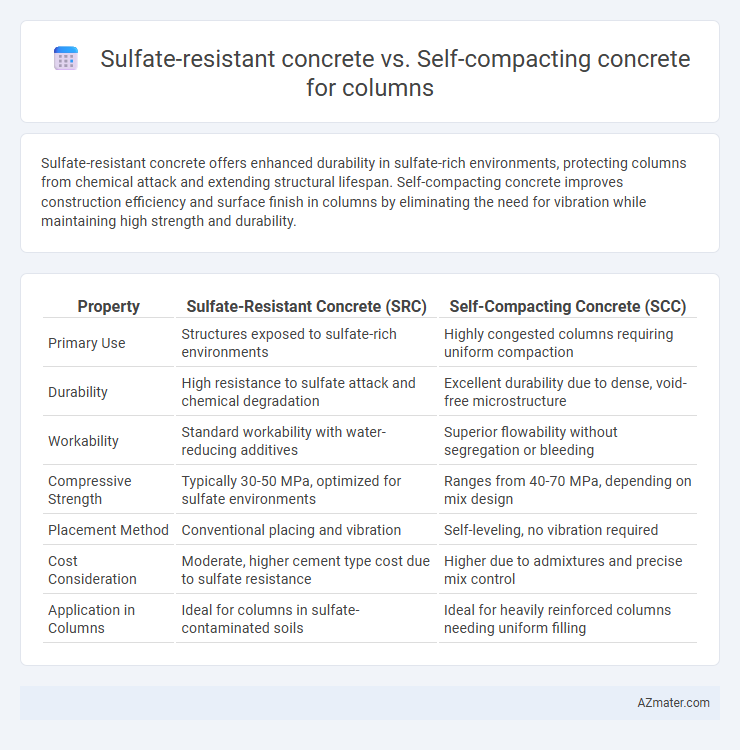Sulfate-resistant concrete offers enhanced durability in sulfate-rich environments, protecting columns from chemical attack and extending structural lifespan. Self-compacting concrete improves construction efficiency and surface finish in columns by eliminating the need for vibration while maintaining high strength and durability.
Table of Comparison
| Property | Sulfate-Resistant Concrete (SRC) | Self-Compacting Concrete (SCC) |
|---|---|---|
| Primary Use | Structures exposed to sulfate-rich environments | Highly congested columns requiring uniform compaction |
| Durability | High resistance to sulfate attack and chemical degradation | Excellent durability due to dense, void-free microstructure |
| Workability | Standard workability with water-reducing additives | Superior flowability without segregation or bleeding |
| Compressive Strength | Typically 30-50 MPa, optimized for sulfate environments | Ranges from 40-70 MPa, depending on mix design |
| Placement Method | Conventional placing and vibration | Self-leveling, no vibration required |
| Cost Consideration | Moderate, higher cement type cost due to sulfate resistance | Higher due to admixtures and precise mix control |
| Application in Columns | Ideal for columns in sulfate-contaminated soils | Ideal for heavily reinforced columns needing uniform filling |
Introduction to Column Concrete Types
Sulfate-resistant concrete is specially formulated to withstand chemical attacks from sulfate-rich soils or water, making it ideal for columns in aggressive environments. Self-compacting concrete offers superior flowability and compaction without mechanical vibration, ensuring high-quality, uniform columns with complex reinforcement. Both types enhance column durability and performance, with sulfate-resistant concrete emphasizing chemical durability and self-compacting concrete optimizing construction efficiency and structural integrity.
Overview of Sulfate-Resistant Concrete
Sulfate-resistant concrete is specially formulated with low C3A cement to withstand aggressive sulfate environments, making it ideal for columns exposed to soil or groundwater with high sulfate concentrations. This type of concrete prevents chemical attack and structural degradation, ensuring enhanced durability and longevity in harsh conditions. Its use in columns is critical for infrastructure in sulfate-rich areas, where conventional concrete might deteriorate rapidly.
Understanding Self-Compacting Concrete
Self-compacting concrete (SCC) is designed to flow easily into formwork, filling complex column molds without the need for vibration, enhancing construction efficiency and surface finish quality. Its high deformability and segregation resistance make SCC ideal for columns with congested reinforcement, ensuring uniform material distribution and reducing labor costs. While sulfate-resistant concrete focuses on durability against chemical attack, SCC optimizes workability and strength parameters essential for structurally sound column construction.
Key Properties of Sulfate-Resistant Concrete
Sulfate-resistant concrete features low permeability and enhanced chemical resistance due to its use of low C3A cement and supplementary cementitious materials like fly ash or slag, which prevent sulfate attack in aggressive environments. This concrete type exhibits high durability, dimensional stability, and reduced risk of expansion and cracking when exposed to sulfate-rich soils or groundwater, making it suitable for columns in harsh conditions. In contrast, self-compacting concrete emphasizes high flowability and workability, allowing for easy placement without vibration but may require additional modifications to achieve sulfate resistance.
Key Properties of Self-Compacting Concrete
Self-compacting concrete (SCC) offers superior flowability and segregation resistance, enabling it to fill intricate column molds without mechanical vibration, ensuring uniform compaction and surface finish. Its high deformability and viscosity reduce voids and honeycombing, enhancing structural integrity and durability compared to sulfate-resistant concrete, which primarily targets chemical resistance. SCC's optimized particle packing and admixture use improve workability and reduce labor requirements, making it ideal for complex column shapes and congested reinforcement zones.
Durability in Aggressive Environments
Sulfate-resistant concrete is specifically formulated to withstand chemical attacks from sulfate-rich soils or groundwater, enhancing column durability in aggressive environments by preventing expansion and cracking. Self-compacting concrete improves durability by ensuring proper consolidation without mechanical vibration, reducing voids and increasing density, which limits the ingress of harmful agents. For columns exposed to sulfates, sulfate-resistant concrete offers superior chemical resistance, whereas self-compacting concrete optimizes structural integrity and uniformity for overall durability.
Workability and Placement Efficiency
Sulfate-resistant concrete exhibits enhanced durability in aggressive sulfate environments but often requires more careful mixing and placement to maintain workability, especially in column applications. Self-compacting concrete (SCC) offers superior workability and placement efficiency, flowing easily into complex column forms without the need for mechanical vibration, reducing labor and time. In columns, SCC significantly improves uniformity and surface finish, while sulfate-resistant concrete is preferred for long-term chemical resistance.
Strength and Load-Bearing Capacity
Sulfate-resistant concrete offers enhanced durability and strength in aggressive sulfate-rich environments, ensuring long-term load-bearing capacity for columns exposed to such conditions. Self-compacting concrete provides high strength through superior compaction without vibration, resulting in uniform density and improved load distribution within columns. Both types exhibit strong load-bearing capabilities, but sulfate-resistant concrete is preferable for chemical resistance, while self-compacting concrete excels in achieving consistent structural integrity and strength.
Cost and Maintenance Considerations
Sulfate-resistant concrete for columns offers enhanced durability in aggressive environments, reducing long-term maintenance costs despite a higher initial material price compared to self-compacting concrete. Self-compacting concrete minimizes labor expenses due to ease of placement and eliminates the need for vibration, lowering immediate construction costs but may require more frequent inspections in sulfate-rich conditions. Choosing between them depends on balancing upfront investment with anticipated maintenance demands, especially in sulfate-exposed infrastructure.
Best Practices for Column Concrete Selection
Sulfate-resistant concrete is essential for columns exposed to aggressive sulfate environments, providing enhanced durability by using sulfate-resisting cement and low permeability mix designs. Self-compacting concrete improves column quality through excellent flowability and consolidation without vibration, ensuring superior surface finish and reduced honeycombing. Selecting the appropriate concrete type depends on environmental exposure, structural requirements, and ease of placement, with sulfate-resistant concrete prioritized for chemical durability and self-compacting concrete favored for complex formwork or congested reinforcement areas.

Infographic: Sulfate-resistant concrete vs Self-compacting concrete for Column
 azmater.com
azmater.com